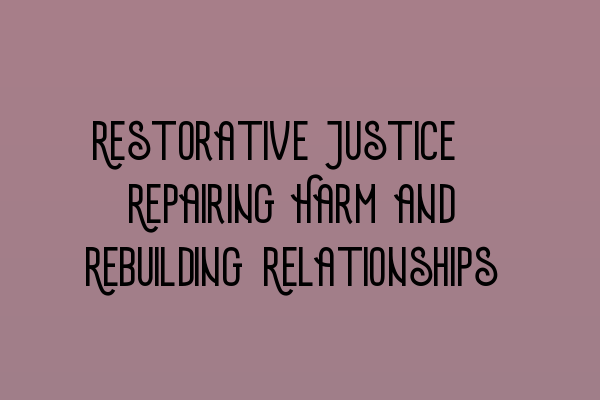Restorative Justice: Repairing Harm and Rebuilding Relationships
Restorative justice has emerged as a powerful alternative to traditional criminal justice approaches, focusing on repairing harm caused by crime and rebuilding relationships between offenders, victims, and their communities. This transformative approach emphasizes accountability and seeks to address the underlying causes of criminal behavior, offering a more holistic and inclusive approach to justice.
The Concept of Restorative Justice
Restorative justice is rooted in the belief that crime is not just a legal violation but also a breach of relationships. It aims to bring together all relevant parties in a safe and controlled environment to address the harm caused, facilitate dialogue, and promote healing and understanding. This process allows victims to be heard, offenders to take responsibility for their actions, and communities to play an active role in the resolution.
Unlike traditional punishment-based approaches, restorative justice focuses on repairing the harm inflicted on victims and communities. It seeks to provide meaningful and appropriate consequences for offenders while addressing the underlying causes of their behavior. By involving all parties, it aims to restore a sense of justice, empowerment, and community cohesion.
The Benefits of Restorative Justice
Restorative justice offers numerous benefits over traditional criminal justice methods. Firstly, it provides victims with a platform to share their experiences, express their needs, and have their voices heard. This can contribute to a sense of closure and healing for the victim, reducing the long-lasting impact of the crime.
Secondly, restorative justice allows offenders to understand the real impact of their actions on victims and communities. By actively engaging with those affected by their behavior, offenders develop empathy, accountability, and a desire for personal growth and transformation. This approach offers them an opportunity to make amends and reintegrate into society in a meaningful and constructive way.
Furthermore, restorative justice promotes community involvement and empowerment. By actively involving affected communities in the resolution process, it strengthens social bonds, encourages dialogue, and fosters a sense of collective responsibility. This community engagement also helps to address the root causes of crime and develop preventive measures that reintegrate individuals effectively.
Implementing Restorative Justice
The successful implementation of restorative justice requires comprehensive training, resources, and collaborative efforts from various stakeholders. Legal professionals, including solicitors, play a crucial role in facilitating restorative justice processes, ensuring fair and impartial proceedings, and upholding the legal framework.
At SQE Criminal Law & Practice Law UK, we recognize the growing importance of restorative justice and its potential to reshape the criminal justice system. Our team of skilled solicitors is committed to providing comprehensive legal assistance and guidance to individuals and communities seeking restorative justice solutions.
If you are preparing for the Solicitors Qualifying Examination (SQE), we also offer SQE 1 and SQE 2 preparation courses to help you master the required knowledge and skills in criminal law practice. Additionally, you can explore our SQE 1 practice exam questions and SQE 1 practice mocks FLK1 FLK2 to enhance your exam preparation.
Moreover, it is crucial to stay informed about the latest SRA SQE exam dates to plan your study and examination schedule accordingly. Our SQE preparation courses will equip you with the necessary tools and knowledge to excel in the upcoming SQE exams.
Conclusion
Restorative justice offers a transformative approach to repairing harm caused by crime and rebuilding relationships between offenders, victims, and communities. By focusing on healing, accountability, and community involvement, it provides a more inclusive and holistic approach to justice. Legal professionals, including solicitors, have a crucial role to play in facilitating restorative justice processes and upholding the principles of fairness and impartiality. Explore SQE Criminal Law & Practice Law UK for comprehensive SQE 1 and SQE 2 preparation courses, practice exams, and essential resources to excel in your legal career.
